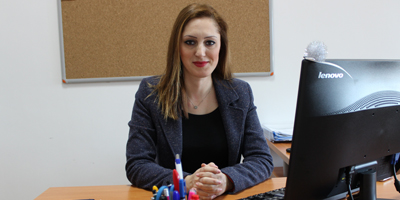EUL Academician Ergin Analyzed “Cancer and Fatigue”

Fatigue is one of the most important symptoms in cancer patients
Head of European University of Lefke (EUL) Faculty of Health Sciences Department of Physiotherapy and Rehabilitation Assist. Prof. Dr. Gülbin Ergin made some statements on the concept of “Cancer and Fatigue” and conveyed detailed information.
Ergin: Many symptoms appear to affect quality of life
Pointing out that cancer is one of the most important social health problems both in the world and in our country, Ergin said that the cancer, which ranks second among the causes of death, is expected to increase rapidly until 2030 and take first place. Ergin said that “Although the survival rates of cancer are improved by current treatment methods (chemotherapy, radiotherapy and surgical treatments), many symptoms that occur in patients due to side effects of applied treatments affect quality of life” and added that cancer treatments may have a negative effect on te cardiovascular system, immune system, respiratory system, gastrointestinal system, musculoskeletal, neuroendocrine and hepatic systems and noted that as a result, quality of life is reduced due to severe exhaustion and severe muscle weakness.
Ergin: Fatigue may persist for months or even years after the cancer treatments
Pointing out that fatigue is one of the most common symptoms that is observed in the cancer patients, Ergin said that “50% -90% of cancer patients experience cancer-related fatigue during or after treatments. In some patients, because of the perceived fatigue severity, the dose of treatments can be reduced and in some cases can be discontinued and can be an effective barrier in the treatment of cancer”. Ergin also pointed out that Fatigue may persist for months or even years after the cancer treatments and said that patients who experience fatigue because of cancer experience complaints such as inactivity due to severe exhaustion, general weakness and feeling of weight, distractibility, sleep disturbances, restlessness, short-term memory problems and daily life activity limitations.
Ergin: The patient should be treated with a multidisciplinary approach
Ergin said that “Training, drug use, exercise, sleep patterns, cognitive therapies and adequate nutrition are important factors in coping with fatigue” and added that the patient should be treated with a multidisciplinary approach and the treatments should be planned according to the evaluations. Ergin further stated that the physiotherapists in this team were primarily responsible for the preparation of the exercise prescription for the daily life activities and quality of life of the patients. Pointing out that exercise reduces the depression, fatigue, anxiety and increases the quality of life in cancer patients, Ergin said that exercise increases the quality of life and well-being and plays an important role in reducing and / or preventing cancer-induced disorders, and ensuring independence in daily life activities. Pointing out that exercise activities approaches to the patient in an integrative way both during and after the treatment, Ergin said that “In the first 4 months of the patients, starting from the exercises covering the whole body, planning is done towards the specific exercises involving the affected systems”.
Ergin: Exercises during and after treatments are known to reduce fatigue in cancer patients
Ergin said that “The purpose of the exercise is to keep the patient as active as possible during the treatments. Aerobic exercises, especially during and after treatments, are known to reduce fatigue and improve quality of life in cancer patients” and added that aerobic exercises suitable for cancer patients are treadmill, cycling, swimming and walking. Ergin stated that while providing a prescription for the exercises, age, gender and medical condition of the patient must be taken into consideration and added that “For this reason, patients should be consulted with a physiotherapist who is experienced in this field, followed by planned exercise programs. In cancer patients, physiotherapy and rehabilitation programs are applied not only to the symptoms of fatigue but also to all other cancer related symptoms”.
